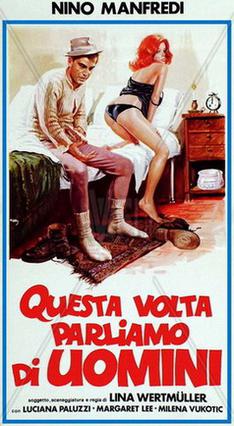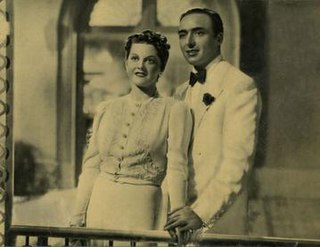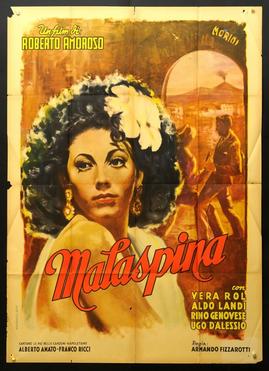Related Research Articles

Questa volta parliamo di uomini is a 1965 Italian tragicomedy film directed by Lina Wertmüller and starring Nino Manfredi. The film was shot in black and white and in 35mm and lasted 91 minutes.

Red Moon is a 1951 Italian melodrama film directed by Armando Fizzarotti and starring Renato Baldini, Maria Frau and Leda Gloria. It takes its title from a popular song.

Melody of Love or Singing City is a 1952 Italian musical melodrama film directed by Mario Costa and starring Giacomo Rondinella, Maria Fiore and Nadia Gray.
Warsaw Premiere is a 1951 Polish historical film directed by Jan Rybkowski and starring Jan Koecher, Barbara Kostrzewska and Jerzy Duszyński. The film's art direction was by Roman Mann. The film portrays the life of the Polish composer Stanisław Moniuszko, particularly focusing on the composition of his 1848 opera Halka. The film was the first Polish costume film made since the Second World War, and was stylistically similar to historical biopics in other Eastern Bloc countries such as Rimsky-Korsakov (1952).

When Naples Sings is a 1930 Italian musical film directed by Mario Almirante and starring Malcolm Tod. The film was originally made in 1928 as a silent film but delays, including the addition of sound, meant it was not released for two years. It consists almost entirely of recorded Neapolitan songs It was shot at the FERT Studios in Turin. The film enjoyed some success, and was distributed in seven South American countries. It has been described as a "poorly made musical film".

Tifosi is a 1999 Italian sports comedy film directed by Neri Parenti.

Lina Gennari was an Italian actress and operetta singer.

Ubaldo Arata was an Italian cinematographer. Arata worked on more than a hundred films between 1918 and his death in 1947. Arata entered cinema in the silent era and worked prolifically during the 1920s including on one of the final entries into the long running Maciste series. He was employed on the first Italian sound film The Song of Love (1930). Until the fall of Fascism, he was one of the leading Italian cinematographers working on propaganda films such as Scipione l'africano and Luciano Serra, Pilot (1938) as well as more straightforward entertainment films.
Naples of Olden Times is a 1938 Italian musical comedy film directed by Amleto Palermi and starring Vittorio De Sica, Emma Gramatica and Elisa Cegani. It was made at Cinecittà in Rome.

Naples Will Never Die is a 1939 Italian comedy film directed by Amleto Palermi and starring Fosco Giachetti, Marie Glory and Paola Barbara. A young French tourist on holiday in Naples meets and falls in love with an engineer. She marries him, but finds his family overbearing and traditional while they consider her to be too extrovert. She leaves him and returns to France, but the couple are eventually re-united.
Armando Fizzarotti was an Italian screenwriter and film director. Fizzarotti was a native of Naples, and his films are generally set in the city. He was specifically hired to direct Malaspina (1947) because of his experience making Neapolitan-style films. The film helped revive Neapolitan cinema, which had been suppressed during the Fascist era as production was centralised in Rome.

Malaspina is a 1947 Italian melodrama film directed by Armando Fizzarotti and starring Vera Rol, Aldo Bufi Landi and Rino Genovese. It is a melodrama, based on a popular song of the same name. Its story of female wrongdoing and ultimate redemption was characteristic of Neapolitan-style cinema.

Tourist Train is a 1933 Italian comedy film directed by Raffaello Matarazzo and starring Marcello Spada, Lina Gennari and Carlo Petrangeli. The film portrays the comic adventures of a group of summertime travellers. It was shot on the Florence-Rome railway and in Orvieto. It was one of a number of films made during the 1930s whose realism pointed in the direction of the later development of Italian neorealism.
The Joker King is a 1935 Italian historical comedy film directed by Enrico Guazzoni and starring Luisa Ferida, Armando Falconi and Luigi Cimara.
Fortunato Misiano was an Italian film producer. In 1946 he founded the Rome-based Romana Film which continued producing films until 1969. The company specialised in turning out films in popular genres during the post-war boom years of Italian cinema.
It Was I! is a 1937 Italian comedy film directed by Raffaello Matarazzo and starring Eduardo De Filippo, Peppino De Filippo and Titina De Filippo. The film was based on a play, Sarà stato Giovannino by Paola Riccora.
Silvio Orsini was an Italian film actor of the silent and early sound era.

Eva Nova (1916–1996) was an Italian actress and singer. She appeared in leading roles in several films during the late 1940s and early 1950s.

Milanese in Naples is a 1954 Italian comedy film directed by Enzo Di Gianni and starring Eva Nova, Ugo Tognazzi and Carlo Campanini. The film's sets were designed by the art director Oscar D'Amico.
Red Love is a 1921 Italian silent drama film directed by Gennaro Righelli and starring Maria Jacobini, Amleto Novelli and Arnold Kent. It was shot at the Fert Studios in Turin.